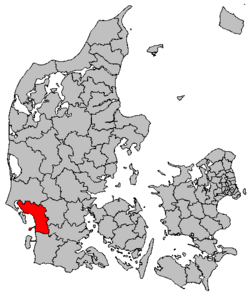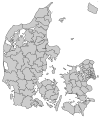Esbjerg Municipality
Esbjerg Municipality
Esbjerg Kommune (Danish) | |
|---|---|
 | |
 | |
| Coordinates: 55°28′00″N 8°27′00″E / 55.4667°N 8.45°E | |
| Country | Denmark |
| Region | Southern Denmark |
| Seat | Esbjerg |
| Government | |
| • Mayor | Jesper Frost Rasmussen |
| Area | |
| • Total | 742.5 km2 (286.7 sq mi) |
| Population (1. January 2024)[1] | |
| • Total | 115,423 |
| • Density | 160/km2 (400/sq mi) |
| Time zone | UTC1 (CET) |
| • Summer (DST) | UTC2 (CEST) |
| Website | www |
Esbjerg Municipality (Danish: Esbjerg Kommune, Danish pronunciation: [ˈesˌpjɛɐ̯ˀ]) is a kommune in the Region of Southern Denmark on the west coast of the Jutland peninsula in southwest Denmark. Its mayor is Jesper Frost Rasmussen, from the Venstre (Center-Right Party) political party. By 1 January 2007, the old Esbjerg municipality was, as the result of Kommunalreformen ("The Municipal Reform" of 2007), merged with the former Bramming and Ribe and a small part of Helle municipalities to form the new Esbjerg municipality. This municipality has an area of 741 km2 (286 sq. miles) and a total population of 115,423 (2024).
Overview
[edit]The main town and the site of its municipal council is the city of Esbjerg, the fifth largest city in Denmark.
Neighboring municipalities with land connection are Tønder to the south, Haderslev to the southeast, Vejen to the east, and Varde to the north. The neighboring municipality to the west is Fanø, an island municipality located in Fanø Bay (Fanø Bugt). Beyond the island of Fanø and Fanø Bay is the North Sea.
Locations
[edit]| Esbjerg | 72,000 |
| Ribe | 8,400 |
| Bramming | 7,200 |
| Tjæreborg | 2,900 |
| Gørding | 1,700 |
| Tarp | 1,700 |
| Andrup | 1,300 |
| Egebæk | 1,200 |
| Gredstedbro | 1,100 |
Infrastructure
[edit]Rail
[edit]Esbjerg Municipality has 13 railway stations, which forms a dense network, compared to other municipalities in Denmark, despite its many rural towns.
| Station | Departing Passengers | Departing trains | Largest destination | |
|---|---|---|---|---|
| 1 | Esbjerg | 753,060 | 32,736 | Bramming |
| 2 | Bramming | 252,685 | 45,508 | Esbjerg |
| 3 | Ribe | 127,894 | 15,135 | Esbjerg |
| 4 | Spangsbjerg | 50,724 | 19,971 | Varde |
| 5 | Jerne | 45,130 | 19,973 | |
| 6 | Gjesing | 44,818 | 19,969 | Varde |
| 7 | Hviding | 41,063 | 10,561 | Esbjerg |
| 8 | Tjæreborg | 30,790 | 19,969 | Esbjerg |
| 9 | Ribe Nørremark | 29,911 | 19,977 | Esbjerg |
| 10 | Gredstedbro | 23,869 | 19,977 | Ribe |
| 11 | Gørding | 21,731 | 14,336 | Esbjerg |
| 12 | Guldager | 9,829 | 19,969 | Esbjerg |
| 13 | Sejstrup | 8,861 | 19,977 | Esbjerg |
Politics
[edit]Esbjerg's municipal council consists of 31 members, elected every four years. The municipal council has seven political committees.[3]
Municipal council
[edit]Below are the municipal councils elected since the Municipal Reform of 2007.
| Election | Party | Total seats |
Turnout | Elected mayor | |||||||||
|---|---|---|---|---|---|---|---|---|---|---|---|---|---|
| A | B | C | D | E | F | O | V | Ø | |||||
| 2005 | 10 | 1 | 1 | 3 | 1 | 15 | 31 | 65.8% | Johnny Søtrup (V) | ||||
| 2009 | 10 | 1 | 5 | 2 | 13 | 61.3% | |||||||
| 2013 | 9 | 1 | 2 | 2 | 15 | 2 | 68.9% | ||||||
| 2017 | 11 | 1 | 1 | 1 | 2 | 3 | 11 | 1 | 69.1% | Jesper Frost Rasmussen (V) | |||
| 2021 | 9 | 1 | 3 | 1 | 3 | 1 | 13 | 64.2% | |||||
| Data from Kmdvalg.dk 2005, 2009, 2013, 2017 and 2021 | |||||||||||||
Twin towns – sister cities
[edit] Eskilstuna, Sweden
Eskilstuna, Sweden Fjarðabyggð, Iceland
Fjarðabyggð, Iceland Jyväskylä, Finland
Jyväskylä, Finland Qeqqata, Greenland
Qeqqata, Greenland Stavanger, Norway
Stavanger, Norway Suzhou, China
Suzhou, China Szczecin, Poland
Szczecin, Poland Tórshavn, Faroe Islands
Tórshavn, Faroe Islands
References
[edit]- ^ BY2: Population 1. January by municipalities The Mobile Statbank from Statistics Denmark
- ^ "ArcGIS Dashboards". www.arcgis.com. Retrieved 2023-03-04.
- ^ Politiske råd og udvalg
- ^ "Venskabsbyer". esbjerg.dk (in Danish). Esbjerg Kommune. Retrieved 2021-04-14.
- Municipal statistics: NetBorger Kommunefakta, delivered from KMD aka Kommunedata (Municipal Data)
- Municipal mergers and neighbors: Eniro new municipalities map
External links
[edit]- Esbjerg's official information portal
- Esbjerg municipality's official website
- The new Esbjerg municipality's official website (Danish only) Archived 2014-12-18 at the Wayback Machine
- Esbjerg Tourism Bureau's website
- SDU Esbjerg
- AAU Esbjerg Archived 2020-03-26 at the Wayback Machine
- The Peace movement of Esbjerg


